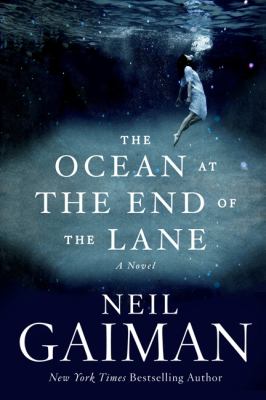
by Neil Gaiman
Book list *Starred Review* In Gaiman's first novel for adults since Anansi Boys (2005), the never-named fiftyish narrator is back in his childhood homeland, rural Sussex, England, where he's just delivered the eulogy at a funeral. With an hour or so to kill afterward, he drives about aimlessly, he thinks until he's at the crucible of his consciousness: a farmhouse with a duck pond. There, when he was seven, lived the Hempstocks, a crone, a housewife, and an 11-year-old girl, who said they were grandmother, mother, and daughter. Now, he finds the crone and, eventually, the housewife the same ones, unchanged while the girl is still gone, just as she was at the end of the childhood adventure he recalls in a reverie that lasts all afternoon. He remembers how he became the vector for a malign force attempting to invade and waste our world. The three Hempstocks are guardians, from time almost immemorial, situated to block such forces and, should that fail, fight them. Gaiman mines mythological typology the three-fold goddess, the water of life (the pond, actually an ocean) and his own childhood milieu to build the cosmology and the theater of a story he tells more gracefully than any he's told since Stardust (1999). And don't worry about that for adults designation: it's a matter of tone. This lovely yarn is good for anyone who can read it. HIGH-DEMAND BACKSTORY: That this is the popular author's first book for adults in eight years pretty much sums up why this will be in demand.--Olson, Ray Copyright 2010 Booklist From Booklist, Copyright © American Library Association. Used with permission. Publishers Weekly "Childhood memories are sometimes covered and obscured beneath the things that come later... but they are never lost for good"-and the most grim of those memories, no matter how faint, can haunt one forever, as they do the anonymous narrator of Gaiman's subtle and splendid modern myth. The protagonist, an artist, returns to his childhood home in the English countryside to recover his memory of events that nearly destroyed him and his family when he was seven. The suicide of a stranger opened the way for a deadly spirit who disguised herself as a housekeeper, won over the boy's sister and mother, seduced his father, and threatened the boy if he told anyone the truth. He had allies-a warm and welcoming family of witches at the old farm up the road-but defeating this evil demanded a sacrifice he was not prepared for. Gaiman (Anansi Boys) has crafted a fresh story of magic, humanity, loyalty, and memories "waiting at the edges of things," where lost innocence can still be restored as long as someone is willing to bear the cost. Agent: Merrilee Heifetz, Writers House. (June) (c) Copyright PWxyz, LLC. All rights reserved. (c) Copyright PWxyz, LLC. All rights reserved Library Journal Gaiman here departs somewhat from his previous books, instead featuring greater emphasis on investigation of the human condition and a more subdued fantasy element. The main character revisits his boyhood, particularly a series of formative events surrounding his friendship with a girl named Lettie Hempstock. The plot rapidly evolves from reminiscent to scary to downright life-threatening, with profound reflections on mortality inherent in the drama. In this ominous environment, seeming evil is explained as a misplaced desire to please, and the ocean at the end of the lane is a liquid knowledge bath transcending space and time that helps rescue the boy. In fact, Lettie is one of the keepers of the ocean, and she and her family represent caretakers who manage the equilibrium of our world and protect the hapless. As we learn the full extent of our narrator's relationship with the Hempstocks, the absolute necessity of the act of forgetting becomes clear. VERDICT Scott Smith's The Ruins meets Astrid Lingren's Pippi Longstocking. A slim and magical feat of meaningful storytelling genius. [See Prepub Alert, 12/16/12.]-Henry Bankhead, Los Gatos Lib., CA (c) Copyright 2013. Library Journals LLC, a wholly owned subsidiary of Media Source, Inc. No redistribution permitted. (c) Copyright Library Journals LLC, a wholly owned subsidiary of Media Source, Inc. No redistribution permitted. |